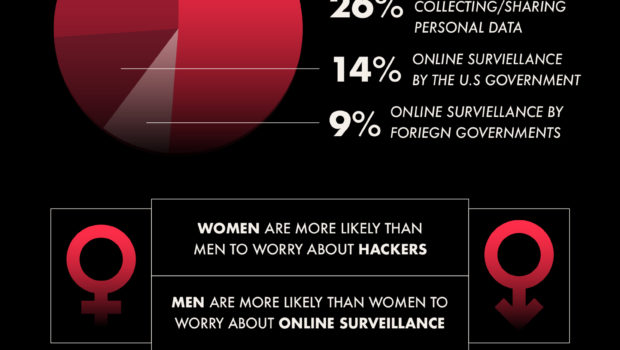Biggest Safety Concern for Most Americans in 2018 is Digital Privacy [Infographic]
The biggest safety concern for most Americans in 2018 is digital privacy. Anyone who follows current events knows why: From major data breaches perpetrated by hackers, governments caught snooping on private internet browser activity, and dubious data collection policies enforced by mega corporations like Facebook and Google, it seems like protecting your data is a pipedream.
But even though internet security is a top concern, is it really a priority for Americans? TheBestVPN, a review website, surveyed 1,000 internet users to gauge how Americans view privacy in 2018. Although the results confirm that many Americans are concerned about their privacy, the most alarming takeaways show that many are not willing to do much about it.
For example, 93 percent of respondents claim they are just as worried or more worried about their online safety in 2018 than they were last year. Of course, the underlying source of that fear varies among internet users:
- 51 percent fear cyber attacks from hackers
- 26 percent fear companies will collect and share their data
- 23 percent fear surveillance from the U.S. government or foreign governments
These fears are not unfounded. According to a study conducted by Pew Research Center, 64 percent of Americans have been the victim of a data breach of some kind, resulting in a general mistrust of key institutions to protect their data.
Although many Americans have experienced a data breach firsthand, the majority of internet users do nothing to improve their security or protect their data. When asked if they had taken any precautionary steps to improve security, like implementing two-factor authentication or avoiding online ads, two-thirds of respondents said they hadn’t.
The issue of cybersecurity in an increasingly digital age will grow more pressing as hackers become more sophisticated. To protect yourself, the best thing you can do is wise up on internet security best practices. Here are some general tips to keep in mind:
- Never submit personal info on spammy websites
- Start blocking web activity trackers
- Use a VPN service
- Avoid sites without HTTPS
- Don’t use public Wi-Fi if possible
- Customize your social media settings
Taking these basic security measures will make you less vulnerable to cyber attacks. To learn more about the study, and how you can protect yourself, take a look at the infographic below.








![Building A Referral Network for Your Business [Infographic]](https://technofaq.org/wp-content/uploads/2017/07/Building_A_Referral_Network_For_Your_Business-150x150.png)







